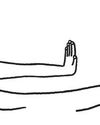
There is little else that the cat can do. All one can do is attempt to watch the animal as it performs its actions, with time suspended and meaningless. As it does, the painful history from the first to the last, the dirt back roads, the chains, and the rattle of iron, are voided in the cat—that dusty old symbol, the red open mouth at the end of a Poe story, a freakish shadow, razor teeth crying behind a wall.
•
What matters is that they were walking that day in opposite directions along the same path, with the neo-Gothic buildings of the university framing a sombre Chicago sky. There was William’s smile and then his voice as Kayla heard it for the first time. She was from a place called Sparks, not far from Reno, a neat little bungalow house on a street snaked with asphalt seam sealer. There was an exchange of words, an adjusting of bodies into casual positions and a forward movement, slightly dancelike, as they talked. It was his freckles, and the frankness of his eyes, and the commonality of the place where they met, too, the way their paths crossed into the initial physical contact—he was looking at his phone when he bumped into her, sent her staggering back—and the comic aspect of the way their bodies touched that afternoon.
•
What matters is that a few weeks later the two of them found him on the corner of Fifty-third and Woodlawn, a street cat with matted black fur and a smear of white cutting across his face at an odd angle that broke the symmetry of his features but made him oddly beautiful. His paws were bloodied and his eyes bloodshot and, when she went to him, he let himself be lifted into her arms and then he relaxed, sagging. It was a cool fall night. “I want to keep him,” she said, and he said, “Yeah, let’s keep him, yes,” and they took him to her apartment.
•
This story is from the January 22, 2024 edition of The New Yorker.
Start your 7-day Magzter GOLD free trial to access thousands of curated premium stories, and 9,000+ magazines and newspapers.
Already a subscriber ? Sign In
This story is from the January 22, 2024 edition of The New Yorker.
Start your 7-day Magzter GOLD free trial to access thousands of curated premium stories, and 9,000+ magazines and newspapers.
Already a subscriber? Sign In

BADDIE ISSUES
\"Wicked\" and \"Gladiator II.\"

LET'S MAKE A DEAL
\"Death Becomes Her\" and \"Burnout Paradise.\"

ANTI HEROES
\"The Franchise,\" on HBO.

FELLOW-TRAVELLERS
The surprisingly sunny origins of the Frankfurt School.

NOW YOU SEE ME
John Singer Sargent's strange, slippery portraits of an art dealer's family.

PARIS FRIEND - SHUANG XUETAO
Xiaoguo had a terror of thirst, so he kept a glass of water on the table beside his hospital bed. As soon as it was empty, he asked me to refill it. I wanted to warn him that this was unhealthy - guzzling water all night long puts pressure on the kidneys, and pissing that much couldn't be good for his injury. He was tall, though, so I decided his insides could probably cope.

WILD SIDE
Is Lake Tahoe's bear boom getting out of hand?

GETTING A GRIP
Robots learn to use their hands.

WITHHOLDING SEX FROM MY WIFE
In the wake of [the] election, progressive women, who are outraged over Donald Trump's victory at the ballot box, have taken to social media with public, vengeful vows of chastity. - The Free Press.

DEADLINE EXTENSION
Old age, reborn.